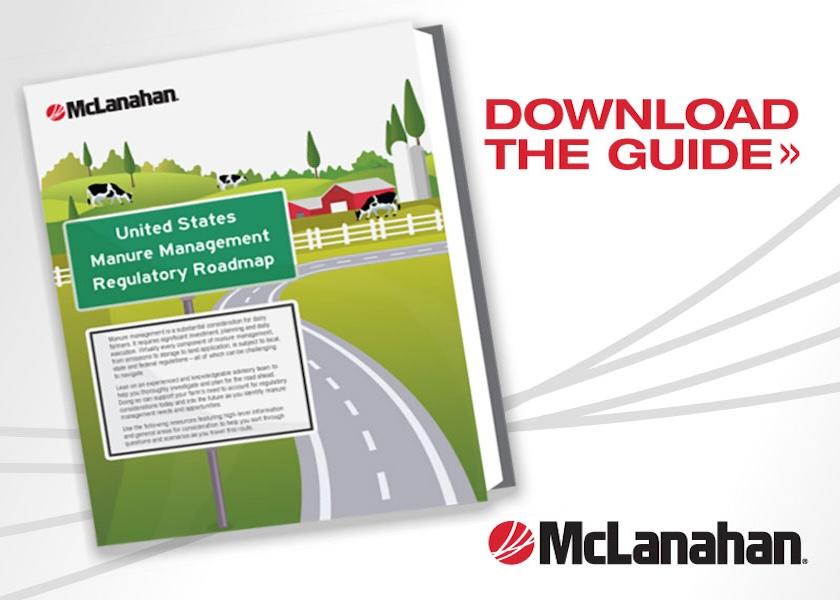Navigating manure regulations: where do you start?

Every dairy must deal with manure, but that’s sometimes easier said than done. Nearly every aspect of manure management, from emissions to storage to land application, is subject to local, state and federal regulations.
Navigating these regulations isn’t always easy. Consider creating a tracking document to outline each regulatory area and develop a comprehensive list of state, local, and federal regulations for your specific location. Also, build a team of experts who can help you prepare a manure management plan that is compliant while still making sense for your dairy.
Research your state’s regulations
Each state has its own guidelines regarding manure regulations. While there are a few major regulatory areas most states have in common, it is best to research each area as it applies to your state to understand the specifics of your location.
The frequency of updates, keeping of records and planner qualifications will also be different for every state, as well. In some states, a nutrient management plan (NMP) must be publicly posted where it can be reviewed.
Creating a nutrient management plan
An NMP identifies the management practices used at your dairy to minimize negative impacts on surface water and groundwater from runoff and leaching from land application. This is unique to each dairy, as factors like crops, soil types, climate, and local conditions are different for every operation. All land applications must be made in accordance with the NMP, and the NMP must be reviewed periodically and updated to include any changes to any of the factors listed in the previous sentence.
A nutrient management plan may also require:
- A list of potential odor sources and methods to minimize those odors
- Provisions for dealing with animal mortalities
- Alternative uses for excess manure
- Analysis of the manure
- Manure nutrient levels
- Planned application rates, timing and location
- Soil tests
- Restrictions on where manure can and cannot be spread
Additionally, some states require an emergency response plan or emergency action plan to be developed for responding to manure, wastewater and pesticide spillage, as well as fuel handling and storage and catastrophic emergencies. In some cases, emergency contact information is also required as part of the plan.
Be sure to follow your state’s guidelines for NMPs, as these can and do affect many other aspects of manure management.
Guidelines for storing manure
Manure storage is also subject to regulation.
The regulations can include guidelines for the volume of the manure storage structure, including considerations for withstanding periods of heavy rainfall and runoff in addition to manure. They also consider the distance these structures are from water supplies. For example, if you are in New York and are receiving state cost-share funds, a professional engineer is required to design and certify the manure storage system.
These are just a few of the guidelines you may see when researching manure storage regulations in your state.
Closely regulated application
Land application is also closely regulated and varies by state. Guidelines for land application of manure can include distance from wells, surface water, sinkholes, open-tile-line intake structures and areas of active snowmelt.
These rules often require you take into account the application rates for climate, crop and type of soil, as well as how much you can saturate the soil. In some states, such as Texas, soil sampling is required.
Like NMPs and manure storage, regulations for the land application of manure vary by state, so it is important to research which guidelines you’ll need to follow.
Is anaerobic digestion in your future?
The production of methane biogas via an anaerobic digester is another factor to consider. Not only does this process create a renewable energy source, but it can also create an additional revenue stream for your dairy.
According to the EPA, methane emissions are directly reduced by anaerobic digester systems used for manure management. In addition, when biogas is used for energy, methane emissions are indirectly reduced from avoided fossil fuel use.
However, anaerobic digesters, like other manure handling strategies, are subject to local, state and federal guidelines for air, solid waste and water.
The power of teamwork
Together, you and your team should stay up to date with these local, state and federal regulations regarding manure management, which are ever-changing and evolving. Also, stay abreast of any industry changes or new technology that can affect your manure management plan.
The goal is to create a plan that is actionable yet flexible enough to adjust to regulation and industry updates or changes in environmental conditions.
Take the time to put a good plan in place and to develop relationships along the way to set your dairy up for future success.
Lean on our experienced and knowledgeable advisory team to help you thoroughly investigate and plan for the manure management regulatory road ahead. Download this eBook to learn more about regulations for manure management in the United States.







